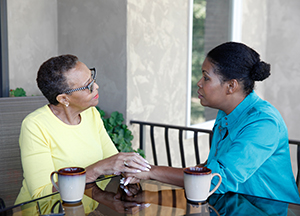One of the brain’s main roles is to allow a person to think, remember, reason, and judge. After a brain injury, a person may be less able to coordinate sequential activities (apraxia), process thought (agnosia), or use language (aphasia). At first, therapy may be provided by medical professionals, physical therapists, and occupational therapists, but it often requires longer-term support by family and friends.
Coordinating functions
Coordinating functions can be hard for a person with a brain injury. Even a simple task, such as combing hair, may be hard. It may need to be broken into steps. The team can teach you how to help the person.
You can help:
-
Find out what your loved one is working on. Ask them to do the task. Allow plenty of time.
-
Break all tasks into simple steps.
-
Change topics or tasks if your loved one gets confused.
-
Use pillboxes to help organize medicines.
Improving memory
One goal is to help people know where they are. Put up signs to label the bathroom, closet, and doorway. Put up maps of the person's room or the gym. Names of family and therapists may be on a daily schedule or in a journal.
You can help:
-
Keep visits short. But try to visit often.
-
Say who you are when you greet your loved one. Ask the same questions often.
-
Look at family photo albums with the person.
Relearning language skills
A person may have trouble understanding or using words. They may need to use gestures or eye blinks to communicate. To help a person relearn words, a therapist may point to an object and ask its name. If a person has physical trouble speaking, exercises may help. A speech therapist may show how to form the lips and mouth to make certain sounds.
Altered speech functions can be frustrating. It is important for family and friends to be supportive.
You can help:
-
Use picture flash cards with the person.
-
Speak slowly. Use common words.
-
Speak in simple sentences. Stick to a single idea or action.
-
Ask yes-or-no questions.
-
Give the person time to understand you and respond.
-
Bring the person back to the main topic.
-
Don’t “talk down” to the person. And don't ignore them.
-
Keep calm if your loved one gets upset or agitated.
Items for rehab
Bring some things to rehab that hold meaning for the person:
-
Photos of family or friends
-
Plants and knickknacks
-
Favorite clothes
-
Posters
-
Music


